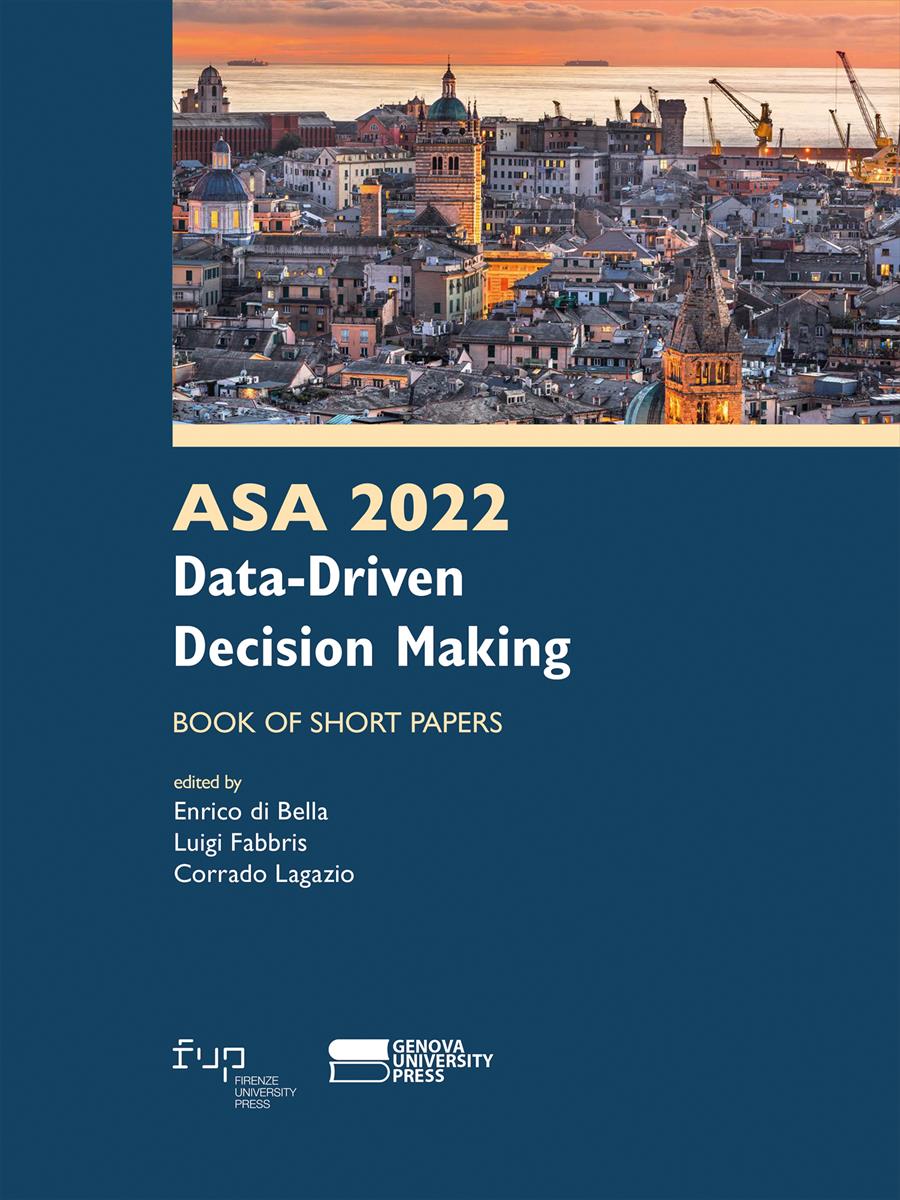- ASA 2022 Data-Driven Decision Making
- A cura di Enrico di Bella, Luigi Fabbris, Corrado Lagazio
Students’ feedback on the digital ecosystem: a structural topic modeling approach
- Adelia Evangelista
- Annalina Sarra
- Tonio Di Battista
- © 2023 Author(s) |
- CC BY 4.0
- DOI: 10.36253/979-12-215-0106-3.36
Starting from March 2020, strict containment measures against COVID-19 forced the Italian Universities to activate remote learning and supply didactic methods online. This work is aimed at showing students’ perceptions towards a learning-teaching experience practised within a digital learning ecosystem designed in the period of first emergency and then re-proposed for the blended mode. Specifically, students, attending six teaching large courses held by four professors in two different Italian universities, were asked to express their impression in a text guided by questions, requiring the reflections and clarification of their and inner deep thoughts on the ecosystem. To automate the analysis of the resulting open-ended responses and avoid a labour-intensive human coding, we focused on a machine learning approach based on structural topic modelling (STM). Alike to Latent Dirichlet Allocation model (LDA), STM is a probabilistic generative model that defines a document generated as a mixture of hidden topics. In addition, STM extends the LDA framework by allowing covariates of interest to be included in the prior distributions for open-ended-response topic proportions and topic word distributions. Based on model diagnostics and researchers’ expertise, a 10-topic model is best fitted the data. Prevalent topics described by respondents include: “Physical space”, “Bulding the community: use of Whatsapp”, “Communication and tools”, “Interaction with Teacher”, “Feedback”.
- Keywords:
- Student feedback,
- digital learning ecosystem,
- open-ended questions,
- pandemic context,
- structural topic models,
University of Chieti-Pescara G. D'Annunzio, Italy - ORCID: 0000-0002-7596-9719
University of Chieti-Pescara G. D'Annunzio, Italy - ORCID: 0000-0002-0974-0799
University of Chieti-Pescara G. D'Annunzio, Italy - ORCID: 0000-0003-2139-7273
- Blei, D. M., Ng, A. Y. , Jordan, M. I. (2003). Latent dirichlet allocation. Journal of Machine Learning Research, 3, pp. 993–1022.
- Carrillo, C., Flores, M.A. (2020). Covid-19 and teacher education: a literature review of online teaching and learning practices. European Journal of Teacher Education, 43, pp. 466–487.
- Chang, V., Fisher, D. (2003). The validation and application of a new learning environment instrument for online learning in higher education, in Technology-rich learning environments: A future perspective, eds. M.S. Khine, D. Fisher , London: World Scien
- Kenneth, B.,Watanabe, K.,Wang, H., Nulty, P., Obeng, A. , M¨uller, S., Matsuo, A. (2018). quanteda: an R package for the quantitative analysis of textual data. Journal of Open Source Software, 3 (30), pp. 774.
- Kuhn, K. D. (2018) Topics and trends in aviation incident reports. Transportation Research Part C: Emerging Technologies, 87, pp. 105–122.
- Pereira, S.P., Fernandes, R.L., Flores, M.A. (2021) Teacher education during the covid-19 lockdown: insights from a formative intervention approach involving online feedback. Education Sciences, 11 (400), pp. 1–14.
- Pennycook, A. (2005). Teaching with the flow: fixity and fluidity in education. Asia Pacific Journal of Education, 25(1), pp. 29–43.
- R Core Team (2022). R: a language and environment for statistical computing. R Foundation for Statistical Computing. Vienna, Austria.
- Rivoltella, P. C. (2021). Apprendere a distanza. Teorie e metodi, Raffaello Cortina Editore. Milano, Italia.
- Roberts, M. E., Stewart, B. M., Tingley, D., Airoldi, E. M. (2013). The structural topic model and applied social science, in Advances in neural information processing systems workshop on topic models: computation, application, and evaluation.
- Roberts, M. E., Stewart, B. M., Tingley, D. (2019). stm: an R package for structural topic models. Journal of Statistical Software, 91(2). DOI: 10.18637/jss.v091.i02
- Rodriguez, M. Y., Storer, H. (2019). stm: a computational social science perspective on qualitative data exploration: using topic models for the descriptive analysis of social media data. Journal of Technology in Human Services, 38(1), pp. 54–86.
- Rothschild, J. E., Howat, A. J., Shafranek, R. M. , Busby, E. C. (2019). Pigeonholing partisans: stereotypes of party supporters and partisan polarization. Political Behavior, 41(2), pp. 423–443.
- Selwyn, N., Jandri´c, P. (2020). Postdigital living in the age of covid-19: unsettling what we see as possible. Postdigital Science and Education, 2(3), pp. 989–1005.
- Zafari, B., Ekin, T. (2019). Topic modelling for medical prescription fraud and abuse detection. Journal of the Royal Statistical Society: Series C (Applied Statistics), 68(3), pp. 751–769.
Informazioni sul capitolo
Titolo del capitolo
Students’ feedback on the digital ecosystem: a structural topic modeling approach
Autori
Adelia Evangelista, Annalina Sarra, Tonio Di Battista
Lingua
English
DOI
10.36253/979-12-215-0106-3.36
Opera sottoposta a peer review
Anno di pubblicazione
2023
Copyright
© 2023 Author(s)
Licenza d'uso
Licenza dei metadati
Informazioni bibliografiche
Titolo del libro
ASA 2022 Data-Driven Decision Making
Sottotitolo del libro
Book of short papers
Curatori
Enrico di Bella, Luigi Fabbris, Corrado Lagazio
Opera sottoposta a peer review
Anno di pubblicazione
2023
Copyright
© 2023 Author(s)
Licenza d'uso
Licenza dei metadati
Editore
Firenze University Press, Genova University Press
DOI
10.36253/979-12-215-0106-3
eISBN (pdf)
979-12-215-0106-3
eISBN (xml)
979-12-215-0107-0
Collana
Proceedings e report
ISSN della collana
2704-601X
e-ISSN della collana
2704-5846
